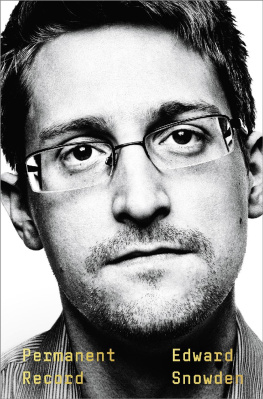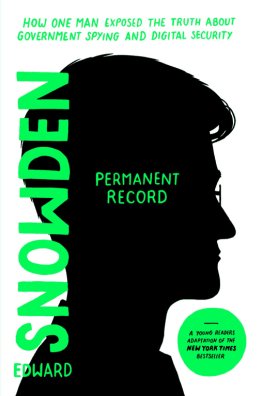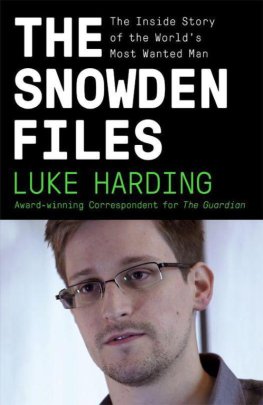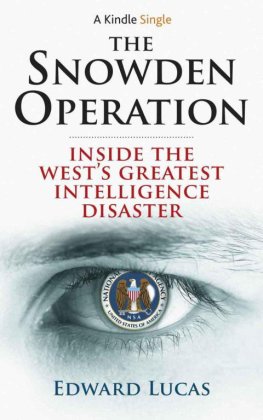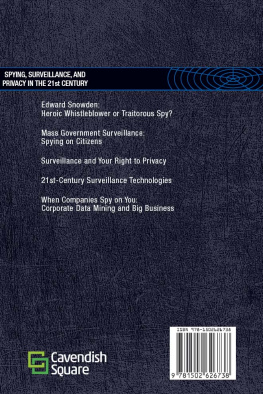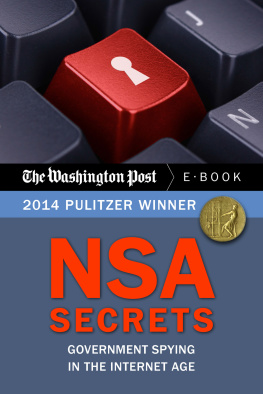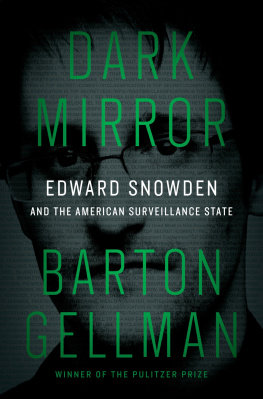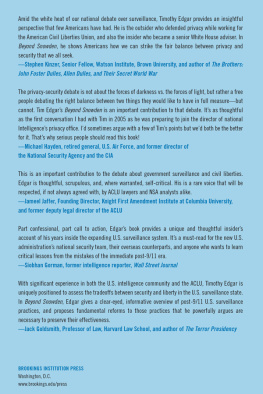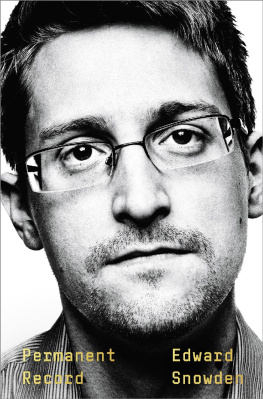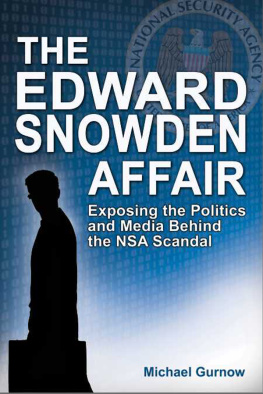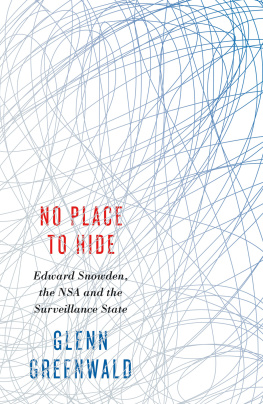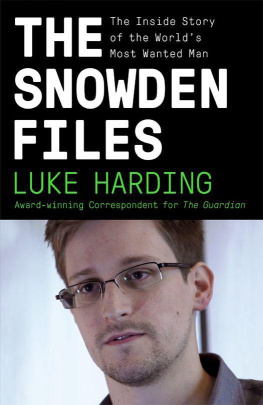To L
My name is Edward Joseph Snowden. I used to work for the government, but now I work for the public. It took me nearly three decades to recognize that there was a distinction, and when I did, it got me into a bit of trouble at the office. As a result, I now spend my time trying to protect the public from the person I used to bea spy for the Central Intelligence Agency (CIA) and National Security Agency (NSA), just another young technologist out to build what I was sure would be a better world.
My career in the American Intelligence Community (IC) only lasted a short seven years, which Im surprised to realize is just one year longer than the time Ive spent since in exile in a country that wasnt my choice. During that seven-year stint, however, I participated in the most significant change in the history of American espionagethe change from the targeted surveillance of individuals to the mass surveillance of entire populations. I helped make it technologically feasible for a single government to collect all the worlds digital communications, store them for ages, and search through them at will.
After 9/11, the IC was racked with guilt for failing to protect America, for letting the most devastating and destructive attack on the country since Pearl Harbor occur on its watch. In response, its leaders sought to build a system that would prevent them from being caught off guard ever again. At its foundation was to be technology, a foreign thing to their army of political science majors and masters of business administration. The doors to the most secretive intelligence agencies were flung wide open to young technologists like myself. And so the geek inherited the earth.
If I knew anything back then, I knew computers, so I rose quickly. At twenty-two, I got my first top secret clearance from the NSA, for a position at the very bottom of the org chart. Less than a year later, I was at the CIA, as a systems engineer with sprawling access to some of the most sensitive networks on the planet. The only adult supervision was a guy who spent his shifts reading paperbacks by Robert Ludlum and Tom Clancy. The agencies were breaking all of their own rules in their quest to hire technical talent. Theyd normally never hire anybody without a bachelors degree, or later at least an associates, neither of which I had. By all rights, I should never have even been let into the building.
From 2007 to 2009, I was stationed at the US Embassy in Geneva as one of the rare technologists deployed under diplomatic cover, tasked with bringing the CIA into the future by bringing its European stations online, digitizing and automating the network by which the US government spied. My generation did more than reengineer the work of intelligence; we entirely redefined what intelligence was. For us, it was not about clandestine meetings or dead drops, but about data.
By age twenty-six, I was a nominal employee of Dell, but once again working for the NSA. Contracting had become my cover, as it was for nearly all the tech-inclined spies of my cohort. I was sent to Japan, where I helped to design what amounted to the agencys global backupa massive covert network that ensured that even if the NSAs headquarters was reduced to ash in a nuclear blast, no data would ever be lost. At the time, I didnt realize that engineering a system that would keep a permanent record of everyones life was a tragic mistake.
I came back to the States at age twenty-eight, and received a stratospheric promotion to the technical liaison team handling Dells relationship with the CIA. My job was to sit down with the heads of the technical divisions of the CIA in order to design and sell the solution to any problem that they could imagine. My team helped the agency build a new type of computing architecturea cloud, the first technology that enabled every agent, no matter where they were physically located, to access and search any data they needed, no matter the distance.
In sum, a job managing and connecting the flow of intelligence gave way to a job figuring out how to store it forever, which in turn gave way to a job making sure it was universally available and searchable. These projects came into focus for me in Hawaii, where I moved to take a new contract with the NSA at the age of twenty-nine. Up until then, Id been laboring under the doctrine of Need to Know, unable to understand the cumulative purpose behind my specialized, compartmentalized tasks. It was only in paradise that I was finally in a position to see how all my work fit together, meshing like the gears of a giant machine to form a system of global mass surveillance.
Deep in a tunnel under a pineapple fielda subterranean Pearl Harborera former airplane factoryI sat at a terminal from which I had practically unlimited access to the communications of nearly every man, woman, and child on earth whod ever dialed a phone or touched a computer. Among those people were about 320 million of my fellow American citizens, who in the regular conduct of their everyday lives were being surveilled in gross contravention of not just the Constitution of the United States, but the basic values of any free society.
The reason youre reading this book is that I did a dangerous thing for a man in my position: I decided to tell the truth. I collected internal IC documents that gave evidence of the US governments lawbreaking and turned them over to journalists, who vetted and published them to a scandalized world.
This book is about what led up to that decision, the moral and ethical principles that informed it, and how they came to bewhich means that its also about my life.
What makes a life? More than what we say; more, even, than what we do. A life is also what we love, and what we believe in. For me, what I love and believe in the most is connection, human connection, and the technologies by which that is achieved. Those technologies include books, of course. But for my generation, connection has largely meant the Internet.
Before you recoil, knowing well the toxic madness that infests that hive in our time, understand that for me, when I came to know it, the Internet was a very different thing. It was a friend, and a parent. It was a community without border or limit, one voice and millions, a common frontier that had been settled but not exploited by diverse tribes living amicably enough side by side, each member of which was free to choose their own name and history and customs. Everyone wore masks, and yet this culture of anonymity-through-polyonymy produced more truth than falsehood, because it was creative and cooperative rather than commercial and competitive. Certainly, there was conflict, but it was outweighed by goodwill and good feelingsthe true pioneering spirit.
You will understand, then, when I say that the Internet of today is unrecognizable. Its worth noting that this change has been a conscious choice, the result of a systematic effort on the part of a privileged few. The early rush to turn commerce into e-commerce quickly led to a bubble, and then, just after the turn of the millennium, to a collapse. After that, companies realized that people who went online were far less interested in spending than in sharing, and that the human connection the Internet made possible could be monetized. If most of what people wanted to do online was to be able to tell their family, friends, and strangers what they were up to, and to be told what their family, friends, and strangers were up to in return, then all companies had to do was figure out how to put themselves in the middle of those social exchanges and turn them into profit.
This was the beginning of surveillance capitalism, and the end of the Internet as I knew it.

